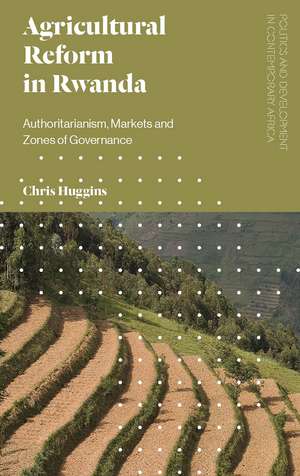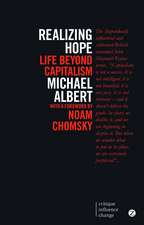Agricultural Reform in Rwanda: Authoritarianism, Markets and Zones of Governance: Politics and Development in Contemporary Africa
Autor Chris Hugginsen Limba Engleză Paperback – 14 apr 2019
| Toate formatele și edițiile | Preț | Express |
|---|---|---|
| Paperback (1) | 159.11 lei 6-8 săpt. | +37.28 lei 4-10 zile |
| Bloomsbury Publishing – 14 apr 2019 | 159.11 lei 6-8 săpt. | +37.28 lei 4-10 zile |
| Hardback (1) | 495.27 lei 3-5 săpt. | |
| Bloomsbury Publishing – 14 oct 2017 | 495.27 lei 3-5 săpt. |
Din seria Politics and Development in Contemporary Africa
-
 Preț: 140.00 lei
Preț: 140.00 lei - 8%
 Preț: 153.16 lei
Preț: 153.16 lei -
 Preț: 144.39 lei
Preț: 144.39 lei -
 Preț: 319.33 lei
Preț: 319.33 lei -
 Preț: 307.67 lei
Preț: 307.67 lei - 21%
 Preț: 217.82 lei
Preț: 217.82 lei - 14%
 Preț: 158.73 lei
Preț: 158.73 lei - 13%
 Preț: 161.32 lei
Preț: 161.32 lei - 13%
 Preț: 170.80 lei
Preț: 170.80 lei - 13%
 Preț: 160.87 lei
Preț: 160.87 lei - 13%
 Preț: 161.76 lei
Preț: 161.76 lei - 30%
 Preț: 570.76 lei
Preț: 570.76 lei - 23%
 Preț: 159.53 lei
Preț: 159.53 lei - 20%
 Preț: 196.08 lei
Preț: 196.08 lei - 30%
 Preț: 567.75 lei
Preț: 567.75 lei - 23%
 Preț: 197.94 lei
Preț: 197.94 lei - 23%
 Preț: 190.75 lei
Preț: 190.75 lei - 23%
 Preț: 190.59 lei
Preț: 190.59 lei - 23%
 Preț: 193.18 lei
Preț: 193.18 lei - 24%
 Preț: 196.89 lei
Preț: 196.89 lei - 23%
 Preț: 193.26 lei
Preț: 193.26 lei
Preț: 159.11 lei
Preț vechi: 184.16 lei
-14% Nou
Puncte Express: 239
Preț estimativ în valută:
30.45€ • 33.06$ • 25.58£
30.45€ • 33.06$ • 25.58£
Carte tipărită la comandă
Livrare economică 22 aprilie-06 mai
Livrare express 15-21 martie pentru 47.27 lei
Preluare comenzi: 021 569.72.76
Specificații
ISBN-13: 9781786990013
ISBN-10: 1786990016
Pagini: 256
Dimensiuni: 135 x 216 x 18 mm
Greutate: 0.32 kg
Editura: Bloomsbury Publishing
Colecția Zed Books
Seria Politics and Development in Contemporary Africa
Locul publicării:London, United Kingdom
ISBN-10: 1786990016
Pagini: 256
Dimensiuni: 135 x 216 x 18 mm
Greutate: 0.32 kg
Editura: Bloomsbury Publishing
Colecția Zed Books
Seria Politics and Development in Contemporary Africa
Locul publicării:London, United Kingdom
Caracteristici
Author has accumulated a wide range of professional experience in the region, including as a researcher for Human Rights Watch and a consultant for USAID.
Notă biografică
Chris Huggins is an assistant professor at the School of International Development and Global Studies, University of Ottawa, as well as being an adjunct professor at the Institute of African Studies, Carleton University, and a non-resident research fellow at the African Centre for Technology Studies (ACTS). He previously worked for Human Rights Watch as their Rwanda researcher, and as a consultant for the United States Agency for International Development. His previous books include Conflict and Housing, Land, and Property Rights (with Scott Leckie, 2011) and From the Ground Up: Land Rights, Conflict and Peace in Sub-Saharan Africa (co-edited with Jenny Clover, 2005).
Cuprins
Introduction 1. Contemporary Agricultural Reforms in Sub-Saharan Africa 2. Theorizing Governance in Post-Genocide Rwanda 3. An Overview of the Political Economy of Agricultural Reform in Rwanda 4. Rwanda's Engagement with International Aid and Foreign Direct Investment 5. Systems of Governmentality and Discipline in Rwanda 6. Agricultural Cooperatives in Musanze District 7. Pyrethrum production in Northern Province 8. Maize Production and 'Fugitive Farmers' in Kirehe District Conclusion
Recenzii
An important contribution to the literature on postgenocide Rwanda. It is also, more broadly, a must-read for anyone interested in the global processes of agrarian transformation.
An in-depth analysis of Rwanda's problematic rural reengineering project. It is an essential contribution to the contemporary literature on post-conflict reconstruction and development.
In a nuanced and compelling account, Chris Huggins explores why Rwanda's ambitious agricultural modernization program has undermined the livelihoods of many of the country's smallholder farmers. It should be required reading for scholars and practitioners engaged with state-sponsored rural development in Africa.
A well researched book on Rwanda, using an interesting blend of theoretical insights. It highlights the drama in Africa associated with capturing peasants for national development while at the same time avoiding elite capture of the public good.
Based on detailed fieldwork, this book substantially advances our understanding of the Rwandan story. Anyone interested in the political economy of African agriculture should read this book.
An extraordinary study of the state-directed commercialization of Rwandan agriculture. In this nuanced account, Huggins reworks the contemporary agrarian question.
Theoretically sophisticated and rich in empirical detail. The book deserves a wide readership and can profitably be read by scholars and policy makers alike.
Drawing on his deep knowledge of Rwanda and extensive fieldwork, Huggins convincingly demonstrates that Rwanda's agricultural development programs represent an extension of the state's authoritarian control, and lead to popular resentment and resistance.
A very informed, nuanced analysis of agriculture in Rwanda, spanning zones of governance, compliance and resistance in a "developmental" state. As always, only some citizens and communities benefit. This book shows us why.
An in-depth analysis of Rwanda's problematic rural reengineering project. It is an essential contribution to the contemporary literature on post-conflict reconstruction and development.
In a nuanced and compelling account, Chris Huggins explores why Rwanda's ambitious agricultural modernization program has undermined the livelihoods of many of the country's smallholder farmers. It should be required reading for scholars and practitioners engaged with state-sponsored rural development in Africa.
A well researched book on Rwanda, using an interesting blend of theoretical insights. It highlights the drama in Africa associated with capturing peasants for national development while at the same time avoiding elite capture of the public good.
Based on detailed fieldwork, this book substantially advances our understanding of the Rwandan story. Anyone interested in the political economy of African agriculture should read this book.
An extraordinary study of the state-directed commercialization of Rwandan agriculture. In this nuanced account, Huggins reworks the contemporary agrarian question.
Theoretically sophisticated and rich in empirical detail. The book deserves a wide readership and can profitably be read by scholars and policy makers alike.
Drawing on his deep knowledge of Rwanda and extensive fieldwork, Huggins convincingly demonstrates that Rwanda's agricultural development programs represent an extension of the state's authoritarian control, and lead to popular resentment and resistance.
A very informed, nuanced analysis of agriculture in Rwanda, spanning zones of governance, compliance and resistance in a "developmental" state. As always, only some citizens and communities benefit. This book shows us why.













